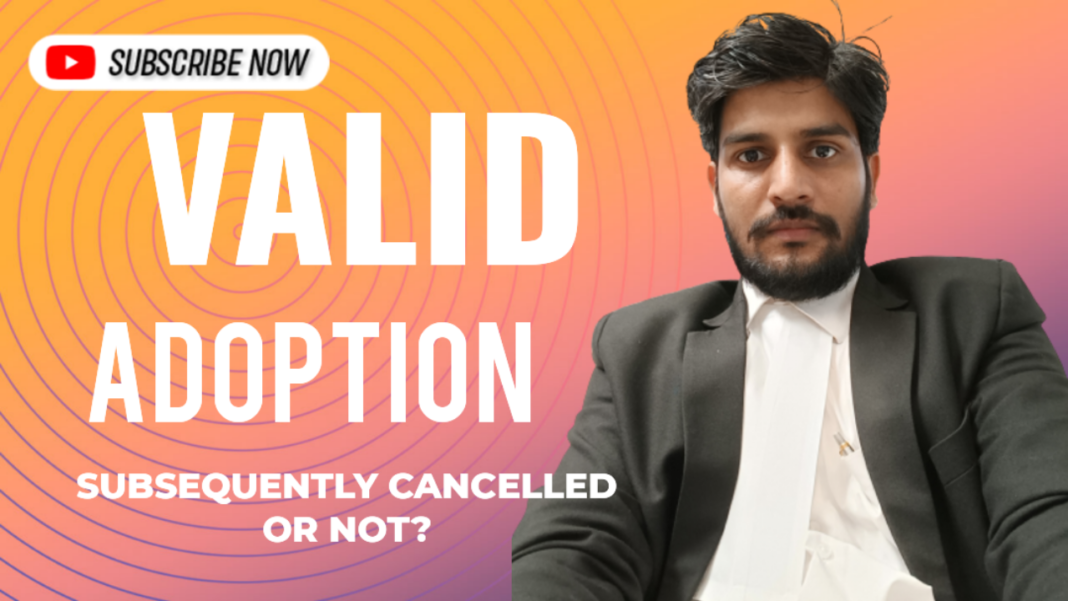Can a valid adoption be subsequently cancelled or not?
(b) Explain the doctrine of the Relation Back Theory on the basis of decided cases. How far they are prevalent at present ?
(c) Explain the important changes brought about by the Hindu Adoption and Maintenance Act, 1956.
Ans. (a) Can a Valid Adoption be Cancelled ? According to S. 15 of the Hindu Adoptions and Maintenance Act, No adoption which has been validly made can be cancelled by the adoptive father or mother or any other on nor can the adopted child renounce his or her status as such by the return to the family of his or her birth’. The adoption has the permanent effect of severance from the natural family of the boy or girl and permanent relation to the adopted family. It cannot subsequently be cancelled. It is however, open to the adopted child to give up or modify his or her rights to properties and inheritance in the adoptive family either before or after the adoption (Kashi Bai V.s. Tatya, 40, Bom. 698.)
(b)Relation Back Theory—When a widow adopts a son for her husband after husband’s death after the property has vested in the collaterals or heirs and successors of the husband, in the eye of law, it would be deemed that the adoption took place during the life-time of the husband and the adopted child was present at the time of husband’s death hence the adoption will relate back to the time of the death of the husband. And under such circumstances the adopted child shall have a right to inherit the property of his adoptive father and if the property has vested in other heirs of the husband, the adopted son shall divest them of the property. The cardinal nile was based on the Relation Back Theory because the adoption relates to back date when the husband of the widow died. The ground on which an adopted son is held entitled to take in defeasance of the rights acquired prior to his adoption is that in the eyes of law his adoption relates back, by a legal fiction to the date of his adoptive father, he being put in a position of a posthumous son.
Scope of the Relation Back Theory—This theory applies only when the claim made by the adopted son relates to the estates of his adoptive father. The estate may be definite and ascertained as when he is the sole and absolute owner of the properties, or it may be fluctuating, as when he is member of a joint Hindu family, in which the interest of the coparceners is liable to increase by death or decrease by birth. In either case it is the interest of the adoptive father which the adopted son is declared entitled to take as on the date of his death. The theory on which this doctrine is based is that there should be no hiatus in the continuity of the line of the adoptive father.
In Pratap Singh Vs. Agarshinghji, 1918, 46 LA. 97: 48 Bom. 778, the Judicial Committee observed, “The Hindu lawyers do not regard the male line to be extinct of a Hindu to have died without male issue until the death of the widow renders the continuation of the line by adoption ‘ impossible” and accordingly their Lordships laid down in clear terms that “the right of the widow to make an adoption is not dependent, on the inheriting as a Hindu female owner has husband’s estate. She can ” exercise power so long as it is not exhausted or extinguished, even though the property was not vested in her.”
In Anant Vs. Shanker, 1935, 52 LA. 161, it was held that the power of a widow of pre-deceased coparcener to adopt for her husband does not come to an end on her son dying unmarried by reason that he was the sole-surviving coparccner in the joint family and his property had vested in a person other than the adoptive widow.
In Divaji Vs. Daddi & Others, A.I. R., 1988, S.C. 845, the Supreme Court has held that proviso (c) of S. 12 departs from the Hindu General Law and makes it clear that the adopted child shall not divest any person of any estate which has vested in him or her before the adoption. (c) Changes Made by Hindu Adoption and Maintenance Act, 1956— This Act has effected the following important changes in the old law of Adoption and Maintenance-
1. It has considerably enlarged the powers of Hindu female to adopt a child. A Hindu woman need not take prior permission of the husband to adopt a child. A widow and an unmarried Hindu female have full right to adopt a child.
2. Now the Act provides the adoption not only of son, but also that of a daughter.
3. The performance of Datta Homan, a religious ceremony is no longer necessary
4. The simple ceremony of giving and taking is only necessary.
5. The upper age limit of the child who is adopted has been fixed at fifteen years unless the custom permits such adoption.
6. The law has been given an uniformity and all differences between various schools and sub-schools have been removed.
7. The father without the consent of the mother, cannot give a child in adoption except in certain circumstances.
8. The adoptee must be below 15 years of age and unmarried unless ihfe custom permits such adoption.
9. Adoptive father or mother shall not be deprived of their power to transfer the property merely by reason of the adoption of a child.
10. Provisions relating to registration and presumption therefore has been made.
11. Specific provisions regarding the maintenance of wife, have entitled have been dearly laid down by the Act.










